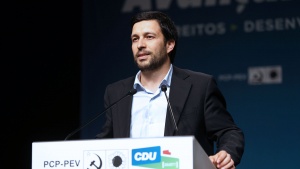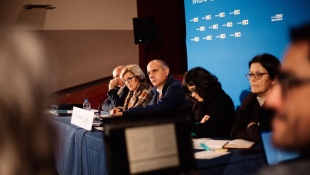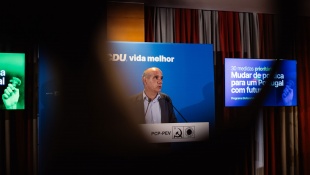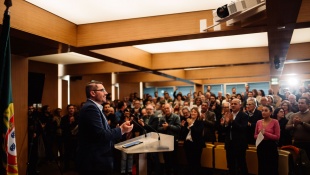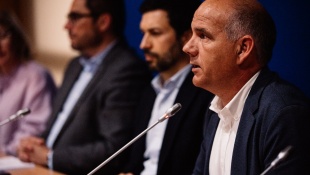An old saying says that a people without memory has no future.
For almost 45 years, the April Revolution opened Portugal to Europe and to the world. I am not only talking about the curiosity, enthusiasm and hope with which it was accompanied, in Europe and in the world. April 25th broke the international isolation imposed by fascism, affirmed national independence and sovereignty, and opened the way for establishing and strengthening economic and cultural relations with other countries and peoples, in some cases for the first time. This was an unquestionable factor for progress and development.
The counter-revolution called into question the achievements of April’s revolution. It broke-off, and in some cases reversed, the project of development shaped in the Constitution. It closed paths and options that the Revolution had opened. Joining the EEC, 33 years ago, was part of this process.
The integration processes are not neutral from the point of view of the interests they support. The European Union, given its political and ideological matrix, its objectives, its capitalist nature, encouraged and supported the right-wing policy of successive national governments.
It encouraged and supported the privatization of national strategic companies and sectors, now under control of foreign capital. It encouraged and supported the abandonment of national production. It encouraged the attack on social rights and supported the decline of public services and social role of the State. It encouraged and supported squeezing wages, the reduction of labor rights and precariousness. It encouraged and supported the increase in inequalities of wealth, the growing of social injustices. It encouraged and supported a sheep-like foreign policy, submitted to command structures and interests contrary to those of the country.
Obviously, those who tied Portugal to this path did not tell what they came for. On the contrary, to hide their true interests, they tried to spread promises and illusions. From the "Europe with us" to "the forefront", everything was used, everything will do.
Those words were forgotten...
The Common Market, first, and the Single Market then, have created opportunities, but for the big capital and the major European powers. It was not a market of 300 million "consumers", first, and 500 million later, which opened to domestic production. It was a 10 million market and national production that were taken by these powers and their multinationals.
Destruction of industry sectors, which were divested or did not withstand the onslaught of unprotected competition. Destruction of hundreds of thousands of farms and the abandonment of hundreds of thousands of hectares of crops and pastures. Destruction of more than half of the fishing fleet. Unemployment. Regional asymmetries and rural abandonment. Food and technological dependence. Unsustainable external debt. This is the stark reality that confronts the promises and illusions sold. Some still repeated today, without much shame, let it be said.
The famous "European funds" are not, and have never been, an expression of the European Union's solidarity with our country. They were supposed to be compensation. This compensation has never compensated for what we have lost, the negative impact of the single market, common policies and above all the single currency. Decreasing compensation, selfish, conditioned to the fulfillment of imposed objectives, smashed by successive governments.
They sold us, and they continue selling, the idea of "shared sovereignty," the "common exercise of sovereignty," and now even the idea of "European sovereignty." The truth however is that we have all realized that "France is France" and that the leader is Germany. The announced intention to put an end to decisions by unanimity, in the few but important areas in which it still exists, is intended to further strengthen the power of the major powers and finally to end the remnants of formal equality between States. The mystifications, however elaborated, do not conceal a new version of "boss who can, obey who must", to which they want to subject us.
Twenty years ago, PS, PSD and CDS tied Portugal to the "forefront" of the euro.
The big national capital and its political representatives disguised this political project of "great national design".
But these twenty years have come and gone to show that the euro, instead of the so-called social progress, has meant social backsliding. Instead of more employment, much more unemployment and precariousness. Instead of improving wages and purchasing power, wages and purchasing power degradation, increased exploitation. Instead of convergence with more developed countries economically, economic and social divergence. With the euro, inequalities, poverty, forced emigration, population aging and regional asymmetries have increased. With the euro, instead of investment, there was disinvestment, deindustrialization, tertiarization and financialization of the economy, denationalization of strategic companies, an explosion of external debt.
Nothing they promised to the Portuguese people, all contrary to what they promised the Portuguese people.
With the euro, Portugal was one of the least developed countries in the world. 0.9% per year, on average. If before the euro we grew more than the average of the European Union and more than the world average, after the euro we grew much below both. We diverge. We're late. Two decades lost. That even the most recent years do not call into question, they confirm.
Faced with the downfall of the euro, its defenders, on a flight to the front, said that the work was unfinished and that it was necessary to complete it. The "reform of the Euro Zone", carried out in recent years, has raised the walls of the euro prison. The euro has become even heavier, more rigid, more devastating.
If the Stability Pact - created in 1997, when most governments in the European Union, including Portuguese, were from so-called socialist parties - severely restricted the margin of maneuver of states to implement policies according to their realities and needs, the revised Stability Pact, Economic Governance, the European Semester and the Budget Treaty - have definitively established the so-called "austerity". The troika's policies were transformed into a single official doctrine.
To the most distracted, there are visas and censorship prior to national budgets, stability programs and national reform programs, designed and monitored by the European Commission; there are the rules that impose budget surpluses and restrictions on investment; there are "automatic correction mechanisms" (such as captives); there are the threats, sanctions and interferences in fundamental spheres of national life.
There is also the Banking Union, which promotes monopoly concentration of the banking sector on an European scale and makes it difficult for public, democratic control of the banking system.
In sum, the developments in the European Union and in the Eurozone condemn countries like Portugal to underdevelopment, stagnation, economic dependence and political subordination.
In these elections to the European Parliament, it is also decided whether we accept this sentence or whether we boldly affirm the sovereign right of the country to its development. If we accept the continuation of this national oppression, which is also a class oppression of the Portuguese workers and people, or if we mobilize the forces to break with dependence and subordination. If we accept that the deepening of the supranational project of economic and political dominion continues to give way to nationalism and the extreme right, or if we affirm national sovereignty as a fundamental element of a progressive alternative.
Everything is clearly separated. On the one side, that of the national abdication, that of the European Union of big capital and big powers, are PS, PSD and CDS (as well as others, equally old but with new packages). On the other side, that of national independence and national sovereignty, that of the workers and the people, on the side of a Europe of workers and peoples, on the side of the struggle for a different and better future is the CDU! A force that assumes the right to fulfill the aspirations and aspirations of the Portuguese people as a project and as an objective of struggle!
In October 2015, the PSD-CDS government was defeated. As evidence that only the forces from CDU pointed out on the election night, when others resigned themselves to the continuity of the destructive action of the previous government. The path then opened would not have been possible without the CDU’s action.
But from the experience of the past three years, there are three conclusions that we must draw and which are of the utmost importance in this battle of the European Parliament elections.
The first conclusion is that progress has been made against the guidelines of the European Union. Never forget that a number of measures have been criticized, threatened and blocked by the European Union. The replacement of wages and stolen holidays; the increase of the national minimum wage, although very insufficient; the replacement of 35 hours of work in the public administration; the increase in retirement pensions; the valuation of social benefits; the reversal of privatizations of public transport companies; among many other important measures for workers and people, have been implemented against the recommendations and pressures of the European Union.
The second conclusion is that, despite this, the policies, guidelines and impositions of the European Union, especially those associated with the Euro, are hindering the response to the country's structural problems and the fair aspirations of the population. They are pulling us back when what is needed is to move forward!
PS and its government submit. PSD and CDS, with hypocrisy and opportunism, criticize the effects, but they support the European Parliament here and there, the policies that provoke them. The results are in evidence: the deterioration of public services, the lack of investment in health, the queues in hospitals and health centers, the chaotic situation in transport, the underfinancing on education and culture, the obsolescence of the national productive apparatus, the regional asymmetries and the abandonment of the rural world, low wages, young people who emigrated and did not return, rights stolen and not yet returned, blackouts in the count of time to service career progression. All of this is in some way linked to submission to the European Union's determinations. This is the concrete meaning of the European Union in the lives of millions of Portuguese, not the sparkling stars on the blue background of official propaganda.
The third and final conclusion is that solving the country’s problems and responding to the fair aspirations of workers and people requires a fundamental change in national policy, requires confronting and face the policies and impositions of the European Union, the policies of the last decades, especially those associated with the Euro and Economic and Monetary Union.
Portugal needs to grow, needs to develop, needs to progress. To do this, we need to eliminate barriers to its development.
Portugal needs to recover public companies and strategic sectors, in strategic areas of the economy - energy, telecommunications, transport, banking and insurance. To recover levers and democratic command of the development process.
Portugal needs a national currency adapted to its specific reality, which competes to promote wages and develop the productive apparatus and not to permanently disadvantage them.
Portugal needs a national central bank which is not a mere counter of the European Central Bank, which guarantees the financing of the last resort of the banking and the State, freeing them from the blackmail of the said financial markets, the rating agencies or the troika.
Portugal needs monetary, financial, exchange and sovereign budgetary management, adjusted to the national situation, which fosters production and investment, which generates employment and growth.
Portugal needs to be freed from the Budget Treaty. But without forgetting that this is just one component of a bigger problem. It was with the euro, after the Budget Treaty, that Portugal became one of the most indebted countries in the world.
Portugal needs to free debt service resources to respond to social and public investment needs.
Portugal needs to defend its internal market, develop and diversify the productive sectors, defend micro, small and medium enterprises. You need to defend the national production, to supply the country better, to borrow less and to trade more.
Portugal needs to value work and workers, promote full employment, increase wages, reduce working hours, work stability and safety, fight against unemployment and precariousness.
Portugal needs to value public services, covering the entire national territory, and to ensure the rights to health, education, social protection, housing, culture and mobility, on an equal footing.
Portugal needs to defend the environment, preserve ecosystems, biodiversity and natural resources. It needs balanced regional development to combat desertification and asymmetries.
Portugal needs an effective subordination of economic power to political power, eliminating the rationale for corruption and other crimes of an economic nature.
Portugal needs a sovereign foreign policy, which respects the constitutional principles, not of a seguidista policy and submissive to the interests of the great powers and NATO.
Portugal needs all this, but all this is in conflict with the guidelines and the functioning of the European Union.
The European Union condemned Portugal and other countries on the periphery of the euro to two decades of stagnation and a colossal debt.
The European Union, which advocates labor deregulation, flexibility, precariousness, increased working hours, raising the retirement age and restraint.
The European Union of social and inter-state inequalities, which has sent promises of economic and social cohesion, which has seen unemployment, poverty and social exclusion grow.
The European Union for the privatization of public services, liberalization, the commercialization of the environment and natural resources.
The European Union designed to defend the interests of the monopolies, the large economic and financial groups, the great powers, to increase their profits and influence.
The European Union's arrogance of colonial aspects, which disrespects democracy, which limits sovereignty, paves the way for nationalism and the extreme right, which launches into a militaristic drift that compromises world peace and security.
To those who deliberately confuse the European Union with Europe, we say that the European Union contradict historical, civilizational principles and values that have resulted from the struggle of the peoples of the European continent.
To those who say that they want to save Europe, wanting to save European capitalist integration, we say that to save Europe, the Europe of the conquests of workers and peoples, the one of the great emancipatory revolutions and their immense legacy, saving this Europe requires defeating the European Union of transnationals and major powers.
To those who want to put people before the false dilemma of choosing between nationalisms and the deepening of capitalist integration, we respond that both defend, by different routes, the same class interests. That the far-right exploits the social discontent created by the policies of the European Union, leading to an even more reactionary drift.
Faced with the deep and drawn-out crisis of European capitalist integration, which reveals its historical limits, it is worth affirming with conviction that another Europe, of workers and peoples, is possible and necessary.
An Europe of progress and not that of social retrogression. An Europe of economic development and not of stagnation and decline. An Europe of democracy and the sovereignty of peoples, of national sovereignties, and not of supra-national impositions of neocolonialist tendencies. An Europe of human rights and not the one that invokes them demagogically and spares. Europe of peace and cooperation and not of militarism and war.
For the CDU, the alternative to the European Union is not the autarky, the isolation.
On the contrary, they are new forms of cooperation in Europe, based on sovereignty and equality of rights of States, geared towards social and economic development, reciprocity of advantages, promotion of the values of peace and solidarity.
Over the last five years, the CDU Members of the European Parliament have maintained a permanent link with the national reality. They have, like none other, followed the country from one to the other, have firmly defended the interests of the workers, the people and the country, fighting decisions that would harm them.
They stood out on the presentation of concrete proposals, measures to minimize the constraints and negative consequences of integration. They fought against supranational impositions, against the threats and blackmail directed against our country, against the limitations of democracy and the will of the people. They promoted all means, resources and possibilities in the interests of Portugal.
They acted in solidarity with the struggle of the workers and peoples of other countries to break with the process of European capitalist integration and to open alternative paths to a project of solidarity cooperation based on peace, progress and social justice.
We struggle with the confidence that nothing can prevent the Portuguese people from affirming and realizing the right to decide their own destiny. Trust justified by the justice of our convictions and the security of positions to which life came to give reason.
With all the confidence and determination, we affirm here that the struggle for a patriotic and left-wing alternative is an integral part of the struggle for another Europe, belonging to workers and peoples. As we fight here and in the European Parliament to defend the workers interests, people’s and country, we give a combative voice to what can be, what has to be and will be another Europe.
CDU is and will be a space of broad convergence, common action and struggle. A project open to all who recognize out distinctive attitude and path. To these we all leave an appeal. We may not always agree, but we are confident that at this point in the life of the country and Europe they will recognize the need to support those who are always on the side of our people; they will recognize that giving more power to CDU in these elections is the most consistent step to untie the nodes that prevent progress in responding to the problems felt by the workers and by the people; they will recognize that adding strength to CDU is the safest way to stop living below our means and far below the potential of the country!
It is without losing memory, with the struggles of the present, moving forward and building the future!
To the work, comrades and friends!
